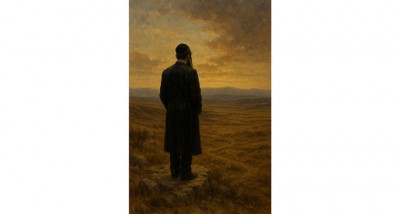
Ha’azinu is not just a song. It’s our past, our present, and our future — all wrapped in verses that are as sharp as they are eternal.
On the day of his death, Moshe Rabbeinu turned to shamayim and aretz — heaven and earth — and called them to witness his final message. Why them? Because only they can be trusted to be there for every generation. People fade, history forgets, but heaven and earth endure. They were present for the oath — and they will be there when it is broken, and again when it is fulfilled.
That’s why Moshe says, “Let this song bear witness.”
I’ve lived through moments when this song played out in real life.
The tochachah — the harsh curses and calamities — are not just metaphors. Our land once flowed with milk and honey. And then, for centuries, it was barren. Foreign travelers like Mark Twain wrote about the desolation of Eretz Yisrael, stunned by how lifeless it had become. That was Ha’azinu come to life.
And yet — the song does not end with devastation.
It ends with hope. With return. With justice. With truth.
G-d promises that even though the Jewish People will stray, suffer, and be scattered — they will return. And the world will witness it. Torah will come back to life. Eretz Yisrael will bloom. And the very nations who mocked us will say, “Well done, Jews — you never gave up on your G-d.”
I’ve seen this too.
I’ve seen Jews who once bowed to Communism, who once believed only in Marx or Stalin, now standing in batei midrash learning Gemara again. I’ve seen the children of atheists davening with tears. I’ve seen Torah reborn in Eretz Yisrael, in Moscow, and even in Shanghai.
Hashem keeps His word — to punish when we forget Him, and to redeem when we return.
At the end of the shirah, Moshe says:
“Glorify, O nations, His people; for He will avenge the blood of His servants, and cleanse His land and His people.”
The judgment will be balanced. Those who overstepped — the Babylonians, the Romans, the Nazis, the Soviets — they will all be held accountable. Even those whom Hashem allowed to strike us will face His judgment — not because they fulfilled His will, but because they rejoiced in it, or went too far, or did so with hate.
Don’t mistake this song for poetry. It’s a contract. It’s a court case. And we all signed it.
By Rabbi Yitzchok Zilber, zt”l, Founder, LaMaalot Foundation
The Song That Never Stops Singing: Parashat Ha’azinu
Typography
- Smaller Small Medium Big Bigger
- Default Helvetica Segoe Georgia Times
- Reading Mode












